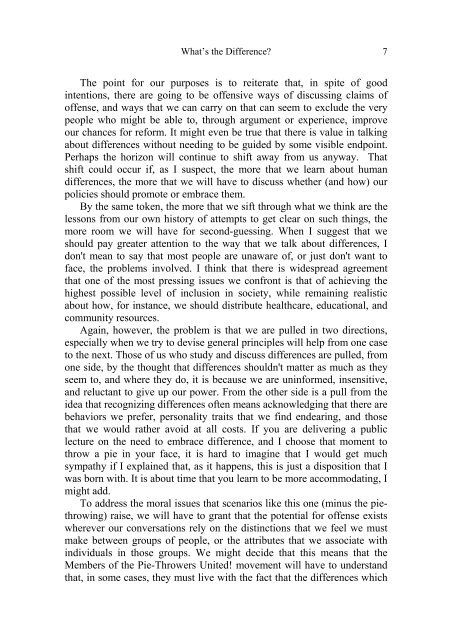978-1-4438-4527-4-sample
978-1-4438-4527-4-sample
978-1-4438-4527-4-sample
You also want an ePaper? Increase the reach of your titles
YUMPU automatically turns print PDFs into web optimized ePapers that Google loves.
What’s the Difference?<br />
The point for our purposes is to reiterate that, in spite of good<br />
intentions, there are going to be offensive ways of discussing claims of<br />
offense, and ways that we can carry on that can seem to exclude the very<br />
people who might be able to, through argument or experience, improve<br />
our chances for reform. It might even be true that there is value in talking<br />
about differences without needing to be guided by some visible endpoint.<br />
Perhaps the horizon will continue to shift away from us anyway. That<br />
shift could occur if, as I suspect, the more that we learn about human<br />
differences, the more that we will have to discuss whether (and how) our<br />
policies should promote or embrace them.<br />
By the same token, the more that we sift through what we think are the<br />
lessons from our own history of attempts to get clear on such things, the<br />
more room we will have for second-guessing. When I suggest that we<br />
should pay greater attention to the way that we talk about differences, I<br />
don't mean to say that most people are unaware of, or just don't want to<br />
face, the problems involved. I think that there is widespread agreement<br />
that one of the most pressing issues we confront is that of achieving the<br />
highest possible level of inclusion in society, while remaining realistic<br />
about how, for instance, we should distribute healthcare, educational, and<br />
community resources.<br />
Again, however, the problem is that we are pulled in two directions,<br />
especially when we try to devise general principles will help from one case<br />
to the next. Those of us who study and discuss differences are pulled, from<br />
one side, by the thought that differences shouldn't matter as much as they<br />
seem to, and where they do, it is because we are uninformed, insensitive,<br />
and reluctant to give up our power. From the other side is a pull from the<br />
idea that recognizing differences often means acknowledging that there are<br />
behaviors we prefer, personality traits that we find endearing, and those<br />
that we would rather avoid at all costs. If you are delivering a public<br />
lecture on the need to embrace difference, and I choose that moment to<br />
throw a pie in your face, it is hard to imagine that I would get much<br />
sympathy if I explained that, as it happens, this is just a disposition that I<br />
was born with. It is about time that you learn to be more accommodating, I<br />
might add.<br />
To address the moral issues that scenarios like this one (minus the piethrowing)<br />
raise, we will have to grant that the potential for offense exists<br />
wherever our conversations rely on the distinctions that we feel we must<br />
make between groups of people, or the attributes that we associate with<br />
individuals in those groups. We might decide that this means that the<br />
Members of the Pie-Throwers United! movement will have to understand<br />
that, in some cases, they must live with the fact that the differences which<br />
7


